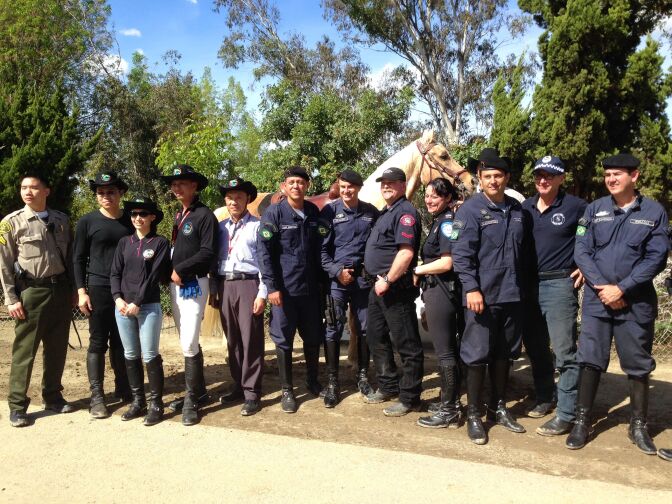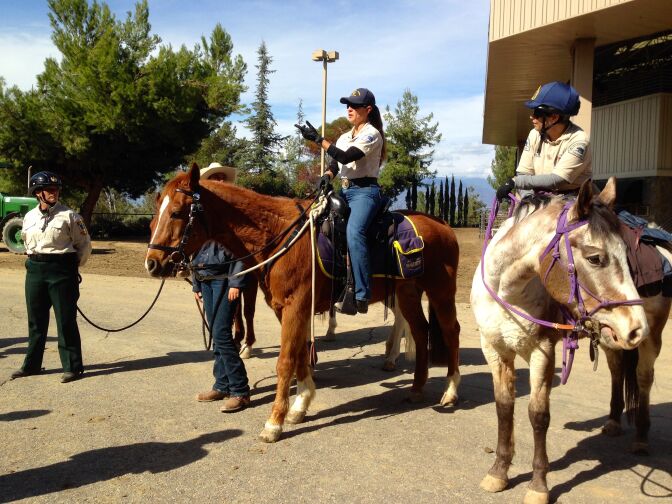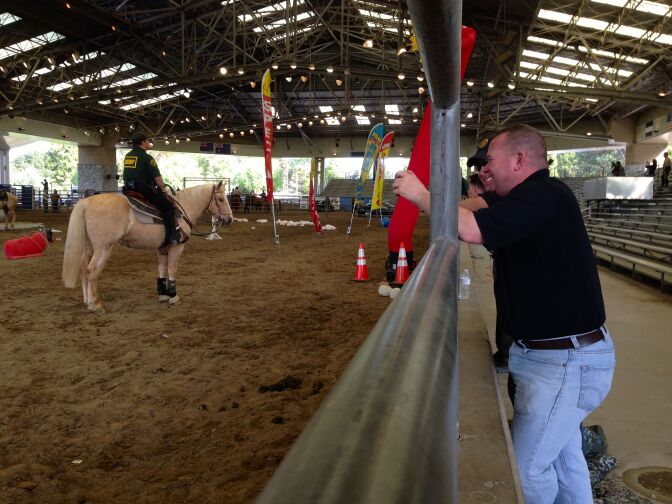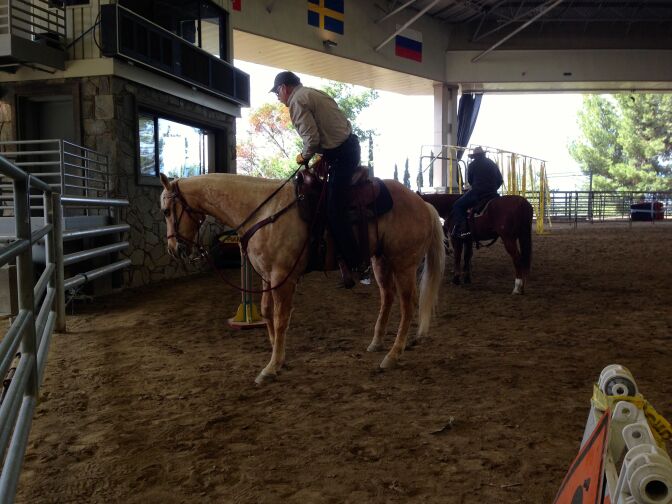This story is free to read because readers choose to support LAist. If you find value in independent local reporting, make a donation to power our newsroom today.
This archival content was originally written for and published on KPCC.org. Keep in mind that links and images may no longer work — and references may be outdated.
Cops on horses: An old-fashioned police technique in the modern age
Police departments sometimes seem like they are in a technological arms race, with departments chasing after the latest gadgets like body cameras, helicopters, and drones.
Nevertheless, many departments across the nation maintain one of law enforcement's oldest policing tools: mounted patrol units, ie, the cop on a horse.
This weekend, about 150 officers from units around the world gathered in the City of Industry for an annual conference to swap best practices and the occasional blooper story. (Horses like to eat--sometimes hotdogs out of unsuspecting civilian hands, apparently.)
L.A. County Sheriff's Sergeant Joe Haertsch admits the equestrian unit he supervises might seem dated.
"Even though it's, I guess you would say 'old technology,' it's very, very valuable in the 21st century," Haertsch said.
The L.A. County Sheriff's Department uses its 180-person unit (mostly comprised of volunteers) for patrolling the county's parks, for crowd control, and regular policing operations. Recently, deputies on horse back participated in a sweep targeting pimps on Long Beach Boulevard in Compton. They can do things deputies in patrol cars often can't, Haertsch said, like jump a curb, turn into a tight alley, and even chase down a suspect who's fleeing on foot through a narrow stretch.
On at least one occasion, Deputy Hill Goodhart said he pulled over another horse.
"I guess you could say it was reckless horse riding," Goodhart said. "There was two of them and they were running as fast as they could."
Like Goodhart, most of the deputies and citizen volunteers in the equestrian unit are horse people. They grew up riding, and made it a part of their career. LAPD Lieutenant Tony Lomedico says the 30-officers in his department's mounted unit are a little different.
"Almost every officer did not know anything about horses," Lomedico said. "They had just established themselves as great Los Angeles police officers."
LAPD's mounted unit is part of the elite Metropolitan Division, made up of many of the department's specialized forces. Like other Metro officers, those in the mounted unit are required to have good marksmanship and maintain good physical fitness.
Horsemanship can come later.
Mitchel Roth, a criminologist at Sam Houston State University, isn't surprised that the officers of the LAPD mounted unit are not lifelong horse people – that's just a product of being generations removed from a society that's familiar with livestock.
Horsemanship, like mounted units in police departments, used to be a practical tool. But they've both now become more of a novelty.
Mounted patrols came about in the 1800's, originally in England and then were adopted in America. At the time, Roth said, the country was rural and crimes like stolen livestock were a big part of police work. Now, not so much.
"It's not to deny that there's value to a mounted unit, but you look at the situations they're used for," Roth said. "How often do you have riots? If you're going to keep a mounted police unit for riots, you might use them once a year."
They make the most sense patrolling parks, he said. In L.A., for instance, the LAPD uses mounted units for search and rescue cases in Griffith Park.
But especially for smaller police forces, mounted units are often the first cut during budget crunches. San Diego recently axed its mounted unit, as did Hartford, Connecticut. Other cities, like Philadelphia, which has a lot of parks, brought their unit back after initially cutting it.
LASD's equestrian unit is almost entirely funded by private donations. In most cases, deputies in the unit have to buy the horses and pay for their care. LAPD's unit is at least partially funded by the city, but also relies heavily on donations, Lomedico said.
In general, mounted units are more of a public relations tool than anything else, Roth said.
"You can't beat seeing a police officer on a horse in a public setting," Roth said. "People like to see tradition and history and this is one of the few things that connects modern policing to the past – seeing them on top of a horse."












